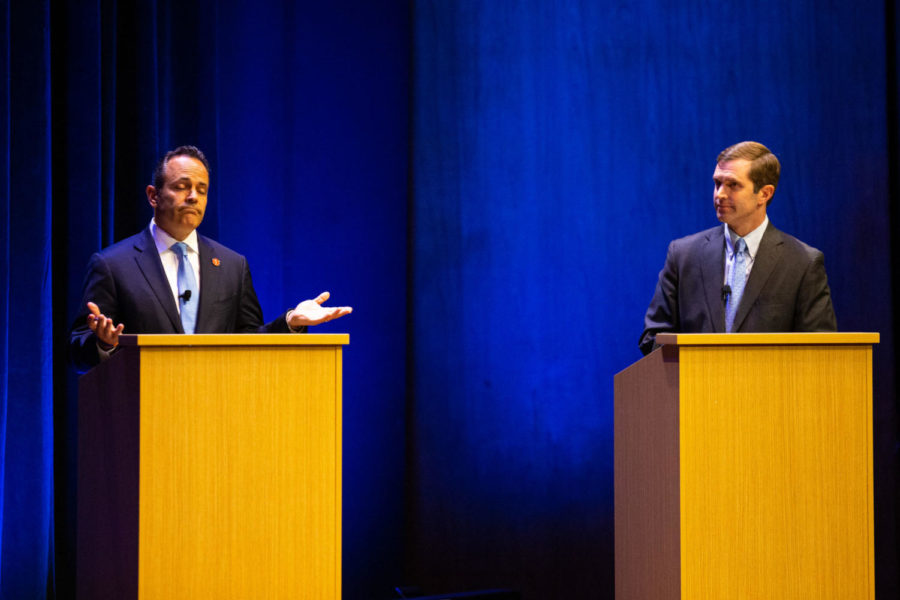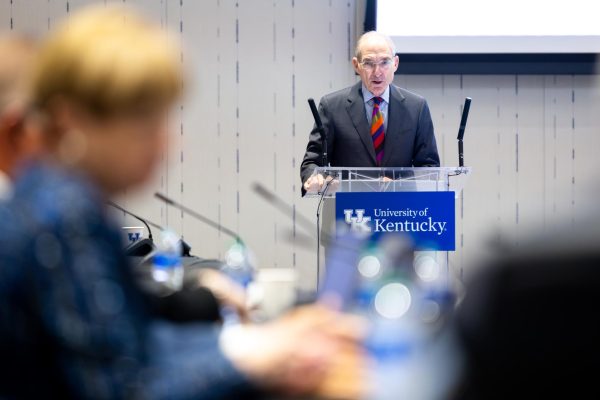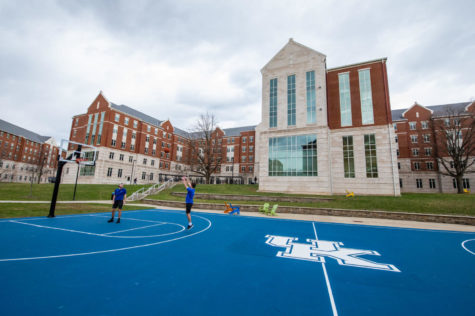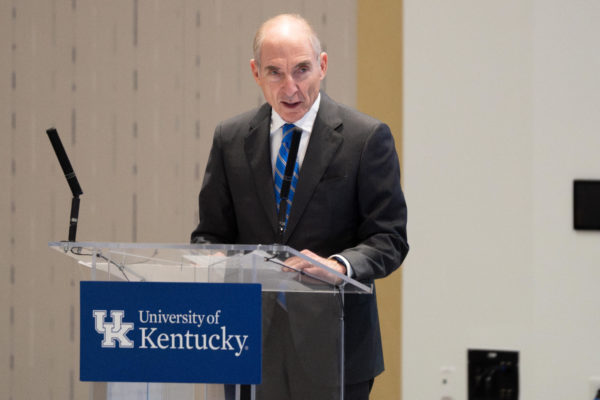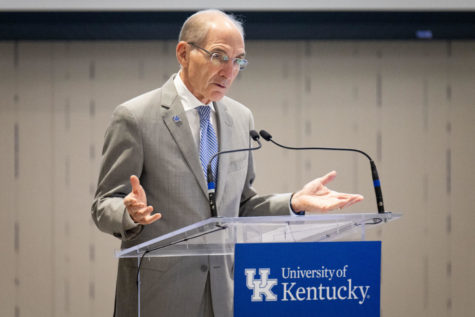What does the governor do for the University of Kentucky?
Candidates for Kentucky governor Matt Bevin and Andy Beshear take part in a debate on Tuesday, Oct. 15, 2019, at the Singletary Center for the Arts on the University of Kentucky campus in Lexington, Kentucky. Photo by Jordan Prather | Staff
October 27, 2019
With a gubernatorial election right around the corner, one question may be looming over college students’ minds: What does the state’s governor have to do with the University of Kentucky?
Kentucky Gov. Matt Bevin and Attorney General Andy Beshear have been gunning for the Kentucky governor title throughout 2019. Most recently, the two went head-to-head in a debate that took place inside UK’s Singletary Center for the Arts.
But what exactly does the governor have to do with UK? And what kind of relationship does the previous governor, Matt Bevin, and Kentucky’s attorney general, Andy Beshear, have with the university based on their time in government?
According to President Eli Capilouto, personal differences don’t mean much when it comes to dealing with state government dealings. Instead, when commenting on his relationship with either of the officials in a meeting with the Kernel, Capilouto said that his responsibility is to “best represent the interests of the University of Kentucky.”
“I work not to put my personal circumstance or opinion in front of that,” Capilouto said. “The university comes first.”
Capilouto said that he will share his opinions about how he feels with the individuals in office directly, because even when they disagree he thinks “direct communication is better.”
“The most valuable currency we have in those situations is trust, even when you don’t agree,” he said. “It’s not personal to me. Do I have personal views that are contrary to those of elected officials? Yes. Do I, in private, tell them that sometimes? Yes. But if it has an impact on the University of Kentucky, that comes first.”
The governor’s actions that affect UK are mainly budgetary.
“I have served as president under two governors and neither one of them has ever increased the budget for higher education in totality,” Capilouto said. “So it is always uphill.”
According to Capilouto, both Gov. Bevin and former Gov. Steve Beshear attempted to cut the budget to higher education in Kentucky more than the state legislature had allowed for during their terms, something Andy Beshear has argued against during his debates.
The Kernel reported that last year, Bevin proposed a 6.25 percent base reduction to all Kentucky postsecondary schools. This cut translated to a $16.1 million reduction to UK’s budget and a $54.3 million combined reduction to all Kentucky public postsecondary institutions.
Bevin also believes strongly performance funding, Capilouto said. Performance funding means that the government will set aside an amount of money per fiscal year for the higher education budget, and the money will be distributed based on a postsecondary school’s performance throughout the previous year.
“The Governor’s support of performance funding for postsecondary education also has been critical. It directly ties additional state funding support to the programs and policies that matter most – namely, our success in enrolling and graduating students of all backgrounds who represent Kentucky’s future,” UK spokesperson Jay Blanton said.
Tuition prices are generally dependent on the amount of funding a Kentucky school gets. While there are other factors involved as well, state funding and budget cuts or increases are generally large determinants in the amount Kentucky’s public postsecondary schooling costs to attend.
Though budgetary interactions are a large part of the relationship between public universities and the governor, it is not the whole of the relationship. At large research universities, like UK, the government may partner with the school on certain projects.
For example, this year, Kentucky received an $87 million grant from the National Institute of Health. UK partnered with the Bevin administration to apply for this grant that would help stop the opioid crisis in Kentucky. This grant was UK’s biggest grant to date at the time.
UK currently has an Office of Government Relations to maintain good relationships with those at Frankfort, Kentucky’s capitol. According to Blanton, UK “has enjoyed a strong and positive relationship and sense of collaboration with Governors and policymakers at all levels for many years.”
“Our state leaders recognize the central importance UK plays in educating and empowering the Commonwealth’s workforce, providing healing and cures for the most advanced diseases, and serving Kentuckians in every county of the state,” Blanton said.
The election will take place on Tuesday Nov. 5 between Andy Beshear and Matt Bevin. Polls open at 6 a.m. and close at 6 p.m.









































































































































